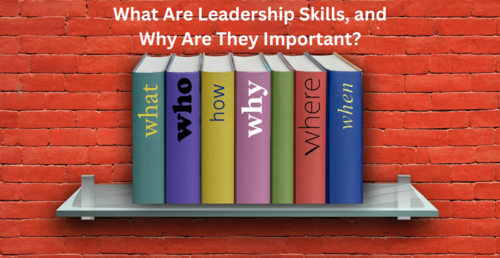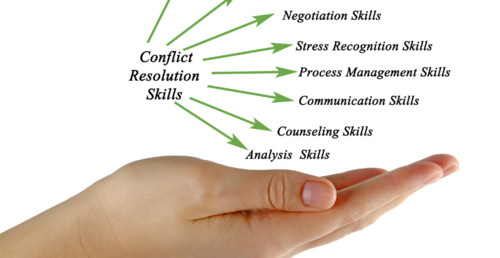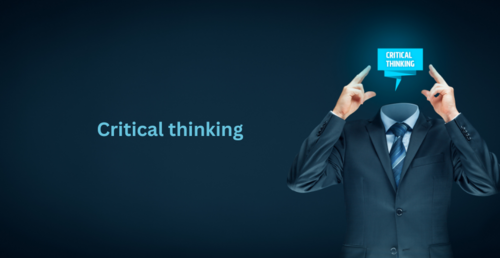
What is the Characteristics of a Good Leader?
.png)
A good leader should have integrity, self-awareness, courage, respect, empathy, and gratitude. They should be learning agile and flex their influence while communicating and delegating effectively. See how these key leadership qualities can be learned and improved at all levels of your organization.
Leaders shape our nations, communities, and organizations.
We need good leaders to help guide us and make the essential large-scale decisions that keep the world moving.
Our society is usually quick to identify a bad leader, but how can you identify a good one? What would most people say are the qualities of a good leader?

Learn what leadership skills are with examples, why they are important, who needs them, and how you can further develop these essential skills.
Leadership skills are the qualities individuals in influential roles possess to direct and complete tasks, support initiatives, create a sense of unity within a team, and empower others. Learn about these key leadership skills and how you can benefit from developing them.
Leadership skills include the abilities or strengths shown by people in management roles that aid in guiding and encouraging a group of people and their team toward achieving a common goal or set of goals. These skill sets include communication, negotiation, conflict resolution, decision-making, and more.
Take a detailed look at some popular leadership qualities companies may value and look for in a candidate.
When you work in a leadership position, you must be able to clearly explain everything from expectations to goals and tasks. It is also important to establish open communication between yourself and your team members. Not only does creating an environment of open communication promote cohesiveness as a team, but it often encourages an atmosphere of transparency. Excellent communication considers not only what is being communicated, but how it is being communicated.
As an effective communicator, you do more than just clearly verbalize expectations. You also incorporate active listening, nonverbal communication, presentation skills, and engaging public speaking.
Negotiation involves two or more parties engaging in a conversation to find a solution that is acceptable to all parties. As a result, you and the person you are negotiating with may reach a formal agreement, such as a contract or a less formal verbal agreement. When used as a leadership skill, negotiation can foster a sense of fairness and equality, allowing all parties to be heard. Employees and coworkers may be more likely to feel understood when conflicts are handled with negotiation.
Effective negotiation involves understanding the interests of all involved parties and working to reach a solution that satisfies each one.

Compelling leaders understand how to avoid disputes and have the ability to resolve them quickly. Ideally, as a good leader, you should be able to maintain your composure and make thoughtful decisions when handling disagreements. A great example of conflict resolution is a human resources (HR) representative actively listening while working to help a manager and their subordinate settle conflict.
As an adaptable leader, you adjust your behavior in response to situational changes. You are resilient when things don't go as expected and recover quickly from setbacks by viewing them as an opportunity to grow. Showing adaptability in leadership involves being flexible and adjusting to changing conditions and environments.

Analyzing information to fully comprehend an issue or topic is the act of critical thinking. The steps of the critical thinking process often entail gathering facts and data, posing deliberate queries, and examining potential answers. For instance, if you work in HR and must settle a dispute between two coworkers, using critical thinking skills can be helpful in determining the nature of the conflict and the appropriate course of action. Critical thinking is an important component of decision-making.
Effective leaders make decisions that benefit themselves, their team members, clients, stakeholders, and organizations. Using critical thinking skills in decision-making allows you as a leader to identify problems and develop solutions advantageous to your business and your employees. Decision-making by leaders must always be fair and objective and involve the use of appropriate language when communicating.

Effective problem solvers in leadership have the ability to foresee issues in the workplace, define the problem, identify their causes, develop a plan to remedy the problem, and learn from the problem to avoid future issues. Problem-solving requires strong communication skills and respect for all parties involved. Viewing and presenting issues as opportunities can benefit leaders and staff alike. An example of this would be a decline in social media engagement viewed as an opportunity to increase social media presence rather than a problem.
The general nature of leadership roles revolves around people. Without understanding the people they are guiding, leaders cannot effectively lead. The ability to forge bonds and establish communities is necessary for an effective leader. A study conducted on relationships in the workplace by Olivet University shows that employees tend to be happier in their workplace when they have a degree of nonwork relationship with their superiors.
Time management involves planning and regulating how much time to devote to different tasks. Leaders who manage time effectively may accomplish more in less time, feel less stressed, and succeed in their careers. Proper time management by leadership members affords leaders more time to invest in their team.

Trust is the cornerstone of a successful organization. Trust, or belief in another person's skills, integrity, and character, is frequently thought of as something built upon in personal relationships.
Leadership develops best through reliability. Leaders must ensure their words and deeds are consistent if they want to be trusted. If those you lead cannot trust you to keep your word, they will lose faith in you rapidly.
A creative mindset is open, not closed or rigid, and produces ideas and solutions that are both significant and effective. By encouraging a team of people to solve problems creatively, leaders provide the opportunity to develop goods and services that set the team apart from rivals, creating a competitive advantage. Creative leaders also foster an innovative culture by encouraging teams to showcase ingenuity as a unit.
Leaders must think strategically and critically when making difficult decisions. Effective leadership involves making well-considered and critically-analyzed decisions to lead teams to success. Leaders who are successful will think before they act, or in other words, have a strategic plan before taking action. The time it takes to devise a strategy depends on the problem or decision. A good leader devotes the necessary time to strategy development.
.jpg)
About: Andries vanTonder (Over 40 years self-employed)
He is a Serial Entrepreneur, an Enthusiastic supporter of Blockchain Technology and a Cryptocurrency Investor
Find me at my Markethive Profile Page | My Twitter Account | My Instagram Acount | and my Facebook Profile.
